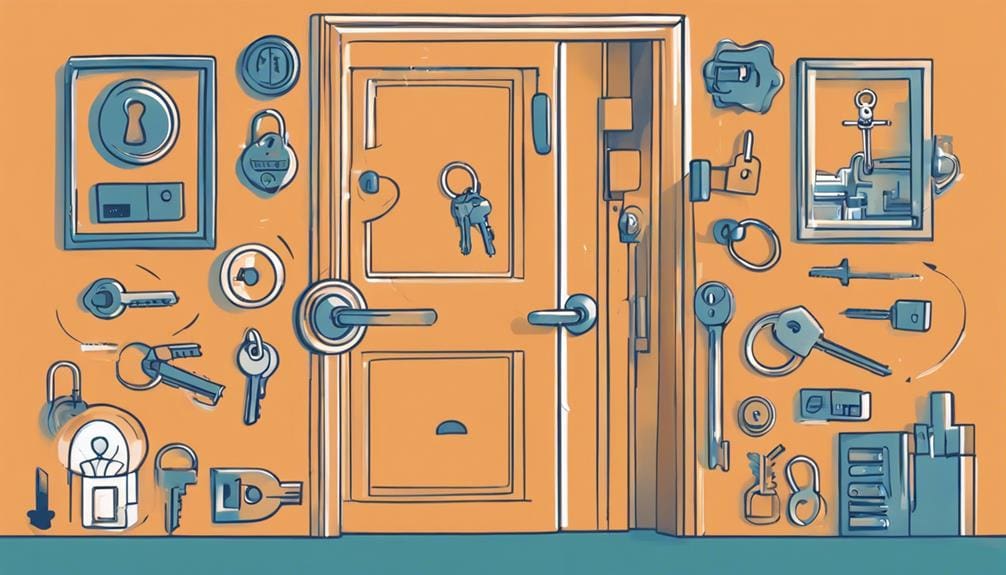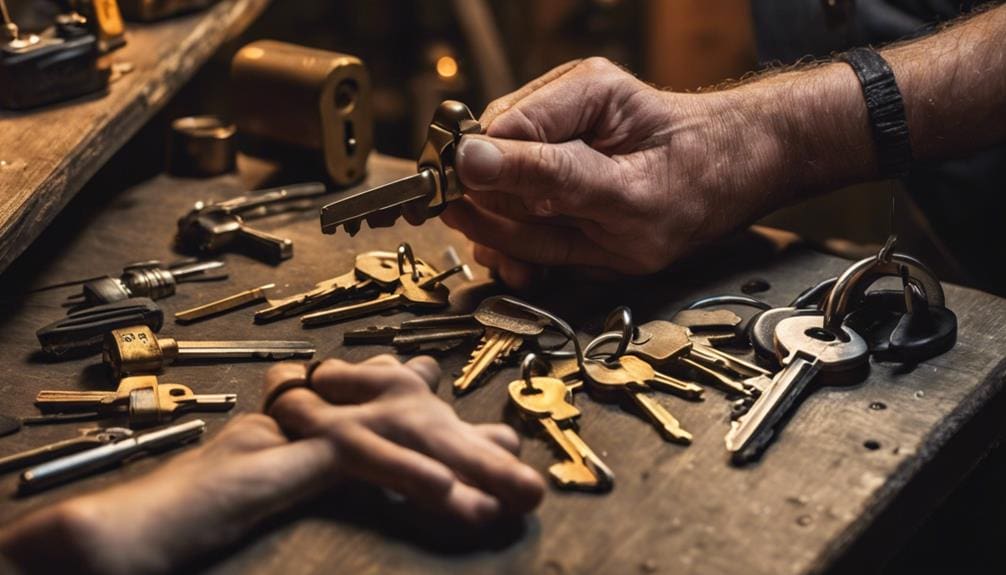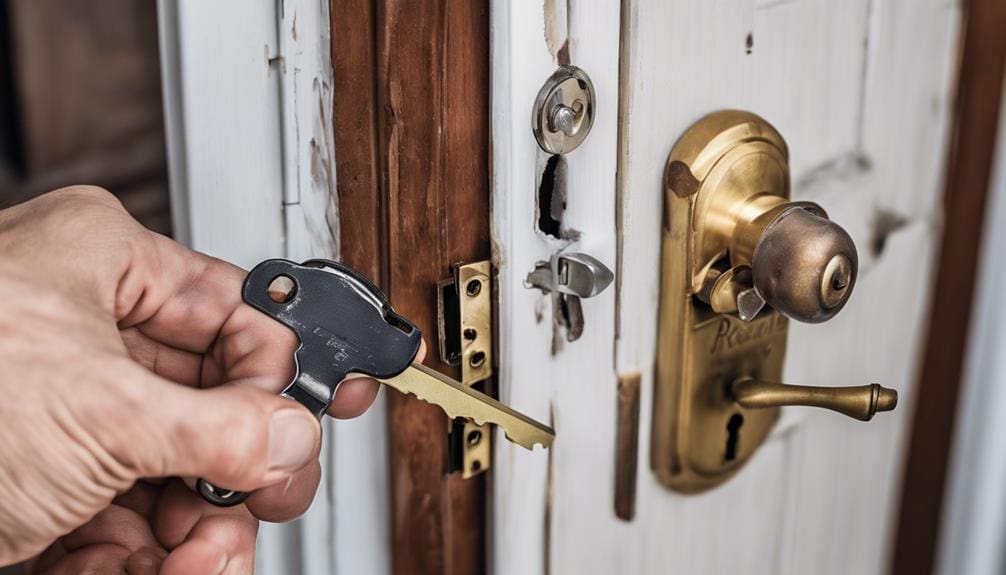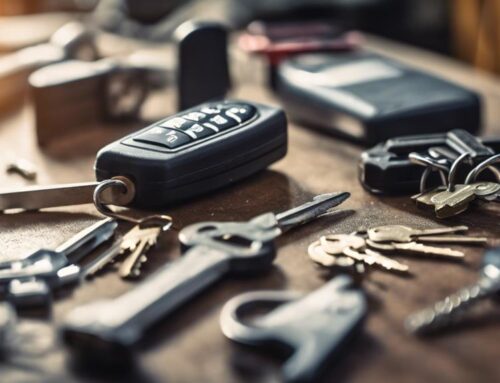Rekeying changes a lock’s internal pins and springs to match a new key pattern, ensuring old keys won’t work. It’s cost-effective, enhancing security without replacing the entire lock. You should rekey when moving into a new home, after losing a key, or during staff changes in a business. This process is efficient, quick, and can be done by professional locksmiths or DIY kits. Rekeying is particularly useful for maintaining security without the expense of full lock replacement. Learn the precise steps and benefits for your situation to fully secure your property.
Key Takeaways
- Rekeying changes a lock’s internal components so a new key pattern operates it, enhancing security.
- It is a cost-effective alternative to replacing the entire lock hardware.
- Rekeying should be done when moving into a new home or office to ensure security.
- It’s essential after losing a key or during staffing changes in businesses.
- Professional rekeying services provide precision and peace of mind, ensuring old keys no longer work.
Understanding Rekeying

Rekeying, the process of changing a lock’s internal components to fit a new key, is an essential security measure for homeowners and businesses alike. When you rekey a lock, you’re altering the pins and springs inside the lock to match a different key pattern. This guarantees the old key no longer works, enhancing security. Whether you’re moving into a new home or addressing lost keys, rekeying is a practical, cost-effective solution. It allows you to maintain your existing door hardware while effectively changing the locks. You can either hire a professional locksmith or use a DIY rekeying kit, depending on your lock’s complexity. Understanding rekeying empowers you to make informed decisions regarding your security needs.
Benefits of Rekeying

Accessing the advantages of rekeying reveals not only enhanced security but also significant cost savings. By altering the lock mechanism, rekeying guarantees that previous keys no longer grant access, effectively preventing unauthorized entry. This method is particularly cost-effective, as it avoids the expense of replacing the entire lock hardware. For businesses, rekeying is invaluable during staffing changes, maintaining security without extensive overhauls. Moving into a new home or after losing a key, rekeying offers a fresh start concerning security, ensuring that only you hold the new keys. By focusing on the lock mechanism, rekeying provides a practical solution for enhancing security while being mindful of budget constraints.
When to Rekey

Moving into a new residence or office requires rekeying to confirm that previous occupants no longer have access. This process is vital for maintaining security in your new home or business. If you’ve lost a key, rekeying is a quick and efficient solution to prevent unauthorized access. It’s a cost-effective measure, especially when changing locks isn’t necessary. For businesses, rekeying is important during staffing changes to maintain a secure environment. It’s a practical step that ensures old keys won’t compromise your security. Whether you’re moving, dealing with lost keys, or managing a business, rekeying provides an immediate, reliable method to enhance safety without the expense of entirely new locks.
Rekeying Vs. Changing Locks

When enhancing security, you might wonder whether to opt for rekeying or changing locks. Rekeying a lock involves adjusting the lock cylinder so it works with a new key, making it a cost-effective solution. Changing locks, on the other hand, replaces the entire mechanism, often offering better security but at a higher cost. Consider these factors:
- Cost Savings: Rekeying is typically cheaper because you only replace the pins, not the entire lock.
- Home Security: Changing locks can upgrade overall security, especially if the current locks are worn out.
- Convenience: Rekeying can be done quickly, often in about 10 minutes.
- Availability: Both options are available at hardware stores, but rekeying is simpler if the lock is still in good condition.
Choose wisely to serve and protect your home.
Professional Rekeying Services

Engaging expert rekeying services guarantees that every lock in your home is secured with precision and expertise. Experienced locksmiths can efficiently rekey multiple locks, ensuring old keys are rendered ineffective. This meticulous process maintains your security and provides peace of mind. When dealing with intricate lock systems, hiring a professional is crucial to guarantee accuracy and reliability.
| Professional Services | Benefits |
|---|---|
| Experienced Locksmiths | Security Assurance |
| Rekey Multiple Locks | Efficiency & Precision |
| Complex Lock Systems | Peace of Mind |
Locksmiths offer rekeying services that are essential for maintaining a secure home environment. By trusting professionals with your rekeying needs, you ensure that security measures are upheld and old keys no longer pose a threat. This practical approach helps you maintain control over your home’s security.
Frequently Asked Questions
What Is the Purpose of Rekeying?
The purpose of rekeying is to enhance security by altering the lock mechanism so that old keys no longer work. You should consider it when you’ve lost a key, moved into a new home, or need to control who has access. Rekeying is cost-effective and maintains existing hardware, making it a practical solution. Additionally, you can rekey multiple locks to use a single key, simplifying management and improving convenience.
When Should You Rekey a Lock?
Imagine peace of mind as a key to your fortress. You should rekey a lock when you move into a new home, lose a key, or experience a change in occupancy. It’s vital after break-ins or security breaches. Rekeying is a cost-effective way to guarantee old keys don’t work, maintaining security without replacing hardware. By doing so, you’re safeguarding those you serve and protecting your environment effectively.
Is It Cheaper to Rekey or Replace Locks?
Rekeying locks is usually cheaper than replacing them. When you rekey, you only change the internal pins and springs, which typically costs between $20 and $60 for basic locks. This process is practical if the locks are in good condition but need a new key for security reasons. Replacing locks involves purchasing new hardware, making it a more costly option. Prioritize rekeying to maintain security cost-effectively.
What Does Rekey Mean?
Rekeying means altering the internal components of a lock, such as pins and springs, so it operates with a new key. You don’t replace the entire lock mechanism, making it cost-effective. This process is vital for enhancing security, especially after moving to a new home or losing a key. As someone serving others, you’ll guarantee their safety and peace of mind by recommending or performing rekeying when necessary.









